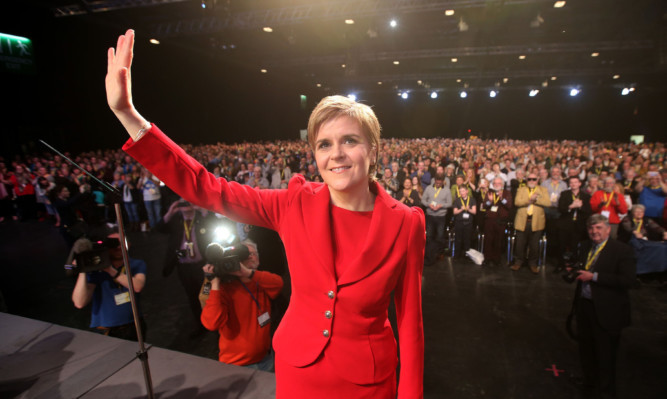Claims that the SNP would be forced to implement an austerity agenda to tackle Scotland’s £15 billion deficit have been dismissed as “ridiculous” by Nicola Sturgeon.
The Scottish First Minister insisted the country has a “fundamentally strong” economy, despite figures recently showing the deficit, as a proportion of GDP, is double that of the rest of the UK.
The SNP leader also hit back at suggestions that a deficit of 9.7% of GDP in 2014-15 put Scotland in a comparable position to countries such as Greece and Italy.
Ms Sturgeon was pressed on the issue when she appeared on BBC One’s Sunday Politics programme.
If voters north of the border had backed independence in 2014, the country would have been just days away from becoming a separate state.
But the recently published Government Expenditure and Revenue Scotland (GERS) figures showed it had a deficit of £14.9 billion for 2014-15 after it was allocated a geographic share of North Sea revenues.
That amounts to 9.7% of Scottish GDP, compared with the overall UK deficit of 4.9% of GDP.
Meanwhile spending in Scotland was £12,800 per person – £1,400 per person more than the UK average.
Presenter Andrew Neil challenged her on the figures, telling the First Minister if Scotland had voted for independence “to cut the deficit to anything like acceptable levels you would either have had to increase tax by 16% or cut spending by 14% or a combination of the two”.
He added: “You would be looking at a list of hospitals and schools to close, nurses and teachers to sack, you would be the austerity party.”
Ms Sturgeon responded: “That’s ridiculous. Countries the world over have deficits and deal with those deficits. We would also have been taking on the greater powers to grow our economy, particularly our onshore economy.”
When the presenter then likened Scotland’s economic situation to that of Greece and Italy, the First Minister said: “I think this argument begins to tip over into being completely incredible when we start to compare Scotland, with all of the strengths of the Scottish economy, to countries like Greece and Italy.
“Yes, we’ve got challenges, we’re not alone in that but Scotland has got a strong economy.”
But Mr Neil called on the First Minister to “thank the rest of the people of the United Kingdom for making up for the deficit you have got”.
Ms Sturgeon was challenged on whether Scotland has the highest deficit in the European Union, with Mr Neil also arguing an independent Scotland would not be allowed to join the EU because of the scale of this.
The SNP leader said: “We have a very challenging and difficult set of figures,I’m not denying that for a second.”
She added it was “a bit rich for anybody, given where we are right now with the prospect of being taken out of the EU looming ahead of us, for anybody to start to scaremonger about the prospects of an independent Scotland in the European Union”.
Had Scotland left the UK she said the country would be dealing with the deficit in “the same way that the UK dealt with it’s deficit in 2009-10 when we had £153 billion, 10.2% of GDP”.
The First Minister said: “Countries suffer deficits but what we would be doing is building on the underlying fundamental strengths of the Scottish economy.
“If you look at the last 10 years our fiscal position has been broadly similar to the rest of the UK, some years it has been much better than the rest of the UK’s, our onshore revenues are growing at a faster rate than the fall in offshore revenues.
“We’ve got higher employment than the UK right now, faster productivity growth, so our economy is fundamentally strong and that would have been a very good basis on which to become an independent country.”
